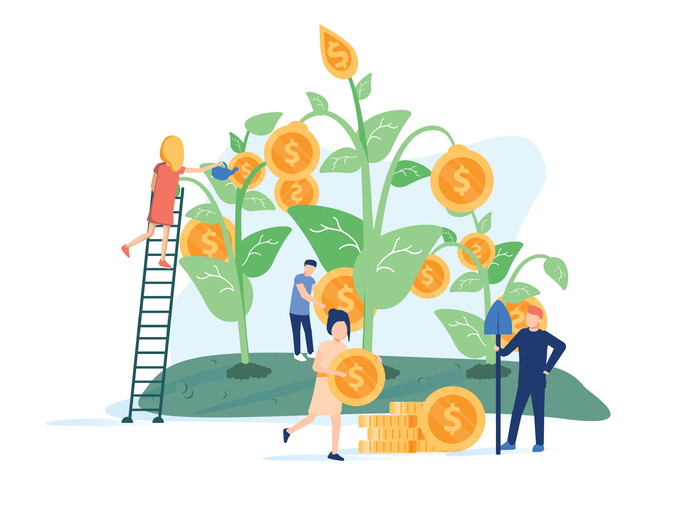Does Sustainable Investing Really Help the Environment?
Experts argue whether green investing is benefitting Wall Street or the planet.
Sustainable investing has been a wild success. For Wall Street, at least.
Mutual funds and exchange-traded funds that focus on ESG (environmental, social, and governance issues) have made a lot of money for investment firms. Investors worried about climate change, in particular, have poured money into such funds, even though the funds charge higher fees than standard funds. More money is expected to flow in. The Labor Department has proposed a rule that would make it easier for investors to buy ESG funds in their 401(k) plans.
For some investors, it is purely a financial bet on a popular sector. Many others are hoping that the billions of dollars flowing into ESG will create positive change for the environment and other causes. But whether Wall Street or Mother Nature will be the ultimate beneficiary of all of these ESG dollars is a difficult question to answer.
We asked two experts to weigh in.
Tariq Fancy, chief executive officer of the Rumie Initiative, an education-technology nonprofit, has been a critic of ESG investing since leaving his job as chief investment officer for sustainable investing at BlackRock. Mr. Fancy says that much needs to be done to address climate change and prevent environmental disasters in the future. He says he doesn’t believe that ESG investing and financial products associated with it are a real help in achieving those goals. In his writings, including an online essay in August, “The Secret Diary of a Sustainable Investor,” he argues that funds that focus on ESG issues are profitable for Wall Street—but amount to a “dangerous placebo” that doesn’t cure the planet’s problems.
Alex Edmans, professor of finance at London Business School and an adviser on responsible investing to Royal London Asset Management and other investment firms, disagrees that the investing efforts represented by ESG funds and other private-investment-based strategies are as pointless as Mr. Fancy says. Dr. Edmans says that while he sees merit in some of Mr. Fancy’s criticisms, they are more sweeping and blanket than justified.
Here are edited excerpts of their discussion, conducted by email:
WSJ:You both have been advocates of sustainable investing, though you disagree about Wall Street’s role. Overall, do you feel better about the fate of the planet now that Wall Street has carved a niche for ESG?
MR. FANCY: Unfortunately, I feel worse about it. Is ESG good for the industry? Undoubtedly yes. It presents a lucrative new opportunity to raise funds and fees. And as an added bonus, it keeps government regulation to address the climate crisis at bay through feeding us yet another narrative in which our answers are solved by the “free market” magically self-correcting.
But good for the planet? I think even Alex would agree that there is no compelling empirical evidence that ESG investing mitigates climate change. Outside of a very small minority of private, long-term funds, such as venture-capital funds that back promising technological solutions to the climate crisis, the vast majority of funds marketed as ESG and sustainable funds today—as well as the nonbinding practice of ESG integration into existing investment processes—can’t point to any real-world impact that would not have otherwise occurred.
DR. EDMANS: I feel modestly better about it. Only modestly better, because Tariq is right that divestment has a negligible effect on company behaviour. But still better, because Tariq’s essay in August ignored the key mechanism through which sustainable investing has impact—engaging with companies on ESG issues. We’ve seen such impact with upstart hedge fund Engine No. 1 getting three climate-conscious directors appointed to Exxon’s board, and this isn’t just an isolated case. Indeed, careful research shows that engagement by index funds, hedge funds and investor collective-action groups creates shared value for both shareholders and society. In particular, activism on ESG issues creates shareholder value as a byproduct, and activism to enhance long-term shareholder value ends up improving ESG.
MR. FANCY: Given the scale of the challenge presented by the climate crisis, we need to stay focused on the bigger picture: The ESG industry may be developing data sets, standards, and ushering in a wave of talented young people to work with them, but these tools are clearly not being combined in the right way right now—given that ESG assets and marketing spin are increasing rapidly alongside carbon emissions, inequality and a host of problems they’re meant to do something about. Are there a few isolated areas where ESG can create win-wins? Sure. But overall, the ESG industry today consists of products that have higher fees but little or no impact and narratives that mislead the public and delay the government reforms we need.
The small wins that Alex highlights, insofar as they exist, are nowhere near sufficient to rapidly decarbonize our economy on the timeline required, which only governments can catalyze through rapidly adjusting the incentives of all the players in the system, for example through a price on carbon. I refer to ESG’s small, mainly marketing wins as “giving wheatgrass to a cancer patient.” And there is now evidence emerging that they may be a giant societal placebo that lowers the likelihood of us following expert recommendations to address the climate crisis. In that sense, the wheatgrass isn’t harmless; it’s delaying the chemotherapy that science tells us we need immediately.
If you sell people a win-win fantasy, they’re less likely to accept the truth: Fighting climate change is going to require an economic transformation that will of course 100% involve the private sector, but must be sparked by government, including through taxes and regulation, and is going to be very difficult and cost us a lot of money.
WSJ:Dr. Edmans, you seem to have more faith than Mr. Fancy in the role of investors in helping the planet.
DR. EDMANS: Tariq is correct that government intervention is key. However, it’s not either/or. Investors launching sustainable funds does not prevent government action; in contrast, doing so encourages action by shifting the so-called Overton window—the range of ideas that is currently acceptable in the political mainstream. Moreover, many investors directly call for government action. In July, investors representing over $6 trillion in assets called for a global carbon price.
MR. FANCY: The only people shifting the Overton window toward a robust response to the climate crisis are brave activists, climate scientists, climate economists and other experts who are telling us that saving the planet will involve taking sacrifices, and needs to happen quickly. The Overton window wasn’t shifted by the ESG industry; on the contrary, today it’s unfortunately being wasted by it by diverting the growing momentum for climate action into yet another dodgy free-markets-self-correct fable.
WSJ: Mr. Fancy in his August essay made the analogy that capitalism is like a basketball game: Each is a competition to score (whether points or profits), and sportsmanship happens only when it’s required under the rules. The implication is that Wall Street doesn’t really have its heart in helping the planet.
DR. EDMANS: Many ESG advocates immediately got on the defensive and started arguing why Tariq’s essay is wrong. But we should first consider the possibility that it might be right. Relying on companies/investors to do the right thing without government action is as naive as having a professional basketball league without rules or referees, but clubs writing glossy purpose statements promising to play fair.
However, the analogy is imperfect in two ways. First, basketball is a zero-sum game. One team can only win if the other loses, and so instances of sportsmanship will be limited. But, in many cases, business is a positive-sum game. Rigorous evidence shows that “sportsmanship” to your stakeholders can also benefit shareholders, so it’s in investors’ own interest to take stakeholders seriously. For example, companies that treat their employees well outperformed their peers in total shareholder returns by a range of 2.3 to 3.8 percentage points a year over a 28-year period—that’s 89 points to 184 compounded. Similar results hold for companies that deliver value to customers, the environment and material stakeholders. Second, many key ESG dimensions can’t be regulated, such as corporate culture—hence the role for investors to hold companies to account.
There are certainly institutional investors who claim that their sustainability actions are a substitute for government action, and who launch ESG products with bold claims of impact to dupe unsuspecting clients to pay fat fees for them. Tariq’s essay has a lot of value in calling them out. However, most true ESG investors don’t do this. They don’t make unsupported claims of impact; their marketing argues that ESG’s main effect is to improve long-term returns rather than change company behaviour. Investors who are late to the ESG game are suddenly jumping on the bandwagon and making a lot of noise in a desperate attempt to play catch-up. Tariq is right to expose them, just like those who promote faddish weight-loss programs should be exposed—but this doesn’t mean the entire weight-loss industry is a ruse.
MR. FANCY: There are indeed areas where small win-wins exist, and where shareholder value can be enhanced by serving all stakeholders. I used to eagerly trumpet these areas in my previous role in sustainable investing. I’ve received an avalanche of messages from people thanking me for saying something they also felt needed to be said. Yet few want to say that out loud themselves, which I understand: I couldn’t have said the same things while I was still in the industry.
I think the ESG industry has the potential to move from serving as a dangerous placebo to playing a leading role in this change, but that requires us having an open and honest debate about how to arrive at a more rigorous and honest ESG 2.0.
 Copyright 2020, Dow Jones & Company, Inc. All Rights Reserved Worldwide. LEARN MORE
Copyright 2020, Dow Jones & Company, Inc. All Rights Reserved Worldwide. LEARN MORE
This stylish family home combines a classic palette and finishes with a flexible floorplan
Just 55 minutes from Sydney, make this your creative getaway located in the majestic Hawkesbury region.
Continued stagflation and cost of living pressures are causing couples to think twice about starting a family, new data has revealed, with long term impacts expected
Australia is in the midst of a ‘baby recession’ with preliminary estimates showing the number of births in 2023 fell by more than four percent to the lowest level since 2006, according to KPMG. The consultancy firm says this reflects the impact of cost-of-living pressures on the feasibility of younger Australians starting a family.
KPMG estimates that 289,100 babies were born in 2023. This compares to 300,684 babies in 2022 and 309,996 in 2021, according to the Australian Bureau of Statistics (ABS). KPMG urban economist Terry Rawnsley said weak economic growth often leads to a reduced number of births. In 2023, ABS data shows gross domestic product (GDP) fell to 1.5 percent. Despite the population growing by 2.5 percent in 2023, GDP on a per capita basis went into negative territory, down one percent over the 12 months.
“Birth rates provide insight into long-term population growth as well as the current confidence of Australian families,” said Mr Rawnsley. “We haven’t seen such a sharp drop in births in Australia since the period of economic stagflation in the 1970s, which coincided with the initial widespread adoption of the contraceptive pill.”
Mr Rawnsley said many Australian couples delayed starting a family while the pandemic played out in 2020. The number of births fell from 305,832 in 2019 to 294,369 in 2020. Then in 2021, strong employment and vast amounts of stimulus money, along with high household savings due to lockdowns, gave couples better financial means to have a baby. This led to a rebound in births.
However, the re-opening of the global economy in 2022 led to soaring inflation. By the start of 2023, the Australian consumer price index (CPI) had risen to its highest level since 1990 at 7.8 percent per annum. By that stage, the Reserve Bank had already commenced an aggressive rate-hiking strategy to fight inflation and had raised the cash rate every month between May and December 2022.
Five more rate hikes during 2023 put further pressure on couples with mortgages and put the brakes on family formation. “This combination of the pandemic and rapid economic changes explains the spike and subsequent sharp decline in birth rates we have observed over the past four years,” Mr Rawnsley said.
The impact of high costs of living on couples’ decision to have a baby is highlighted in births data for the capital cities. KPMG estimates there were 60,860 births in Sydney in 2023, down 8.6 percent from 2019. There were 56,270 births in Melbourne, down 7.3 percent. In Perth, there were 25,020 births, down 6 percent, while in Brisbane there were 30,250 births, down 4.3 percent. Canberra was the only capital city where there was no fall in the number of births in 2023 compared to 2019.
“CPI growth in Canberra has been slightly subdued compared to that in other major cities, and the economic outlook has remained strong,” Mr Rawnsley said. “This means families have not been hurting as much as those in other capital cities, and in turn, we’ve seen a stabilisation of births in the ACT.”
This stylish family home combines a classic palette and finishes with a flexible floorplan
Just 55 minutes from Sydney, make this your creative getaway located in the majestic Hawkesbury region.






















